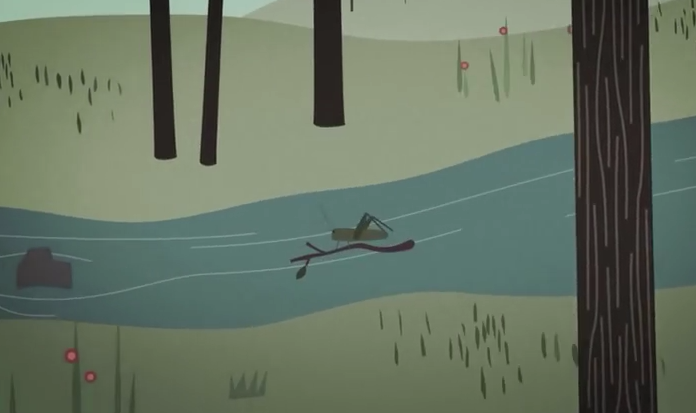One of the clearest places to find good metaphors is in poems.
詩歌是最容易出現好隱喻的地方。
Take this haiku by the 18th century Japanese poet Issa. "On a branch floating downriver, a cricket singing."
以18世紀日本詩人小林一茶的俳句為例。“樹枝順流而下,蟋蟀在上面歌唱。”
The first way to meet a metaphor is just to see the world through its eyes:
發現隱喻的的第一種方法就是通過世界本身的眼睛看世界:
An insect sings from a branch passing by in the middle of the river.
樹枝在河中央順流而下,一只昆蟲在上面歌唱。
Even as you see that though, some part of you recognizes in the image a small portrait of what it's like to live in this world of change and time,
即使你看到,你的一部分認出畫面描繪的是生活在一個由變化和時間構成的世界里是什么感覺
our human fate is to vanish, as surely as that small cricket will, and still, we do what it does. We live, we sing.
人終有一死,蟋蟀也一樣即便如此,我們依舊活著,歌唱。
Sometimes a poem takes a metaphor and extends it, building on one idea in many ways.
有時,詩歌里有一個隱喻并把它擴展用不同的方法描繪一個構思。

Here's the beginning of Langston Hughes' famous poem "Mother to Son."
這是蘭斯頓·休斯最著名的詩《母親致兒子》的開頭:
"Well, son, I'll tell you. Life for me ain't been no crystal stair.
“噢,兒子,我來告訴你:我的人生沒有水晶般的階梯。
It's had tacks in it, and splinters, and boards torn up, and places with no carpet on the floor."
那上面釘著釘子,有碎片,木板也是裂開的,地面沒鋪地毯——光禿禿的。”
Langston Hughes is making a metaphor that compares a hard life to a wrecked house you still have to live in.
蘭斯頓·休斯將艱難的生活同不得已居住的年久失修的房子相比。
Those splinters and tacks feel real, they hurt your own feet and your own heart,
這些碎片和釘子十分真實,它們會劃傷你的腳掌和內心,
but the mother is describing her life here, not her actual house.
但母親是在描述自己的生活而不是房子。
And hunger, and cold exhausting work and poverty are what's also inside those splinters.
饑餓,寒冷令人疲憊的工作以及貧窮也在碎片之中。
Metaphors aren't always about our human lives and feelings.
隱喻并不總是同人類生活和情感相關。
The Chicago poet Carl Sandburg wrote
芝加哥詩人卡爾·桑德堡曾寫道:
"The fog comes on little cat feet. It sits looking over harbor and city on silent haunches, and then moves on."
“霧來了,輕輕地,踏著小貓的腳步。靜靜地,它坐下觀看,觀看城市和港口然后再重新上路。”
The comparison here is simple. Fog is being described as a cat.
這里的比喻十分簡單。霧被形容成小貓。
But a good metaphor isn't a puzzle, or a way to convey hidden meanings, it's a way to let you feel and know something differently.
好的隱喻不是猜謎,不用來傳達隱藏的含義,而是讓你從不同角度感受了解事物。
No one who's heard this poem forgets it.
聽過這首詩的人都不會忘。
You see fog, and there's a small grey cat nearby.
你看見大霧,附近伴隨著一只小灰貓。
Metaphors give words a way to go beyond their own meaning.
隱喻讓詞語超越它們本來的意思。
They're handles on the door of what we can know, and of what we can imagine.
它們是門上的把手,是我們可以了解、想象的。
Each door leads to some new house, and some new world that only that one handle can open.
每扇門通向新的房子和新的世界,只有一個把手可以打開。
What's amazing is this: By making a handle, you can make a world.
最令人稱奇的是這個:你可以通過造一個把手來制造一個世界。











